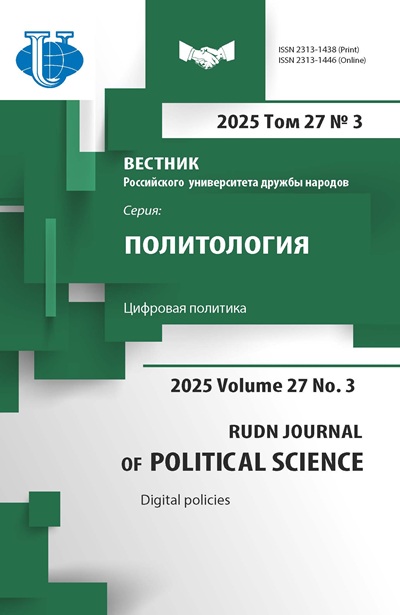‘Not With Us - Against Us’: ‘We’ vs. ‘They’ in the Transformation of Black Lives Matter Participants’ Collective Identities in Online Interactions with All Lives Matter, 2013-2014
- 作者: Koncha V.1
-
隶属关系:
- HSE University
- 期: 卷 27, 编号 3 (2025): Digital policies
- 页面: 479-493
- 栏目: POLITICS ONLINE
- URL: https://journal-vniispk.ru/2313-1438/article/view/348831
- DOI: https://doi.org/10.22363/2313-1438-2025-27-3-479-493
- EDN: https://elibrary.ru/OKJUIY
- ID: 348831
如何引用文章
全文:
详细
First- and third-person plural pronouns drive the construction and transformation of collective identities in digital protest discourse. Drawing on social identity theory and discourse-analytical approaches, the research analyzes a corpus of 100,000 tweets from July 2013 to December 2014. It examines changes in the use of “we” and “they” by Black Lives Matter (BLM) participants in online discourse before and after the emergence of the counter-protest movement All Lives Matter (ALM). Using trigram-based collocation analysis with Pointwise Mutual Information (PMI) scoring, the study reveals a shift from a diffuse and morally framed in-group identity in 2013 to a more consolidated and movement-specific identity in 2014. Simultaneously, the referents of “they” evolved from state institutions such as the police to include ideological opponents from civil society. These findings support the hypothesis that the emergence of counter-protests altered the discursive boundaries of opposition, resulting in a more polarized and dualistic structure of collective identity. The study contributes to scholarship on protest-counter-protest dynamics by highlighting the linguistic mechanisms through which group identities are formed, contested, and reconfigured in response to ideological confrontation.
作者简介
Valeriya Koncha
HSE University
编辑信件的主要联系方式.
Email: vkoncha@hse.ru
ORCID iD: 0000-0001-6588-6752
Postgraduate student, Lecturer at the Department of Politics and Management, Junior Researcher at the International Center for the Study of Institutions and Development
Moscow, Russian Federation参考
- Adam-Troian, J., Bonetto, E., & Arciszewski, T. (2021). “We shall overcome”: First-person plural pronouns from search volume data predict protest mobilization across the United States. Social Psychological and Personality Science, 12(8), 1476–1485. https://doi.org/10.1177/1948550620987672 EDN: HKDNBX
- Goodman, S., Perkins, K.M., & Windel, F. (2024). All Lives Matter discussions on Twitter: Varied use, prevalence, and interpretive repertoires. Journal of Community and Applied Social Psychology, 32(2), e2767. https://doi.org/10.1002/casp.2767 EDN: AKRMCM
- Gordon, P.C., Grosz, B.J., & Gilliom, L.A. (1993). Pronouns, names, and the centering of attention in discourse. Cognitive Science, 17, 311–347.
- Gulevich, O. (2019). Psychology of intergroup relations. Moscow: Uright. (In Russian).
- Inata, K. (2021). Protest, counter-protest and organizational diversification of protest groups. Conflict management and peace science, 38(4), 434–456.
- Koncha, V. (2025). BERT in focus: Topic modeling the transformation of collective identities of the participants of the Black Lives Matter movement in response to the counter-protest. Political science (RU), 1, 219–239. (In Russian). https://doi.org/10.31249/poln/2025.01.10 EDN: FOFOZE
- Melucci, A. (1996). The playing self: person and meaning in the planetary society. New York, Cambridge: Cambridge university..
- Pennebaker, J.W., Mehl, M.R., & Niederhoffer, K.G. (2003). Psychological aspects of natural language use: Our words, our selves. Annual Review of Psychology, 54, 547–577.
- Thomas, E.F., Mavor, K.I., & McGarty, C. (2012). Social identities facilitate and encapsulate action-relevant constructs: A test of the social identity model of collective action. Group Processes & Intergroup, Relations, 15(1), 75–88.
- van, Zomeren, M., Postmes, T., & Spears, R. (2008). Toward an integrative social identity model of collective action: A quantitative research synthesis of three socio-psychological perspectives. Psychological Bulletin, 134(4), 504–535.
- Wodak, R. (2012). Language, power and identity. Language Teaching, 45.
- Wood, L. (2020). Policing counter-protest. Sociology compass, 14(11), 1–10.
- Zald, M.N., & Useem, B. (1987). Movement and countermovement interaction: Mobilization, tactics, and state involvement. In Zald M.N., McCarthy J.D. Social movements in an organizational society (p.247-272). New Brunswick: Transaction.
补充文件








